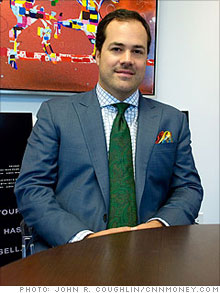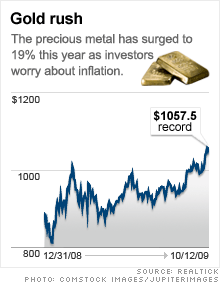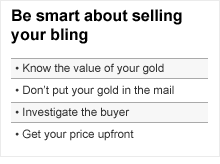Selling your gold? Don't get taken
As gold prices hit record highs, consumers are rushing to trade their bling for some serious cash. But experts warn that you shouldn't jump at the first cash-for-your-gold ad you see on TV.
 |
| Consumers need to do their homework first before they rush to sell their gold, says CIRCA CEO Chris Del Gatto. |


| MMA | 0.69% |
| $10K MMA | 0.42% |
| 6 month CD | 0.94% |
| 1 yr CD | 1.49% |
| 5 yr CD | 1.93% |
NEW YORK (CNNMoney.com) -- With the price of gold as high as it's ever been, more people are rummaging through their dresser drawers, safe-deposit boxes and anywhere else they can to trade their forgotten bling for a thick wad of cash.
But proceed with extreme caution -- especially if you find yourself lured by a late-night infomercial promising fast and easy cash for simply mailing your jewels in a pre-paid plastic envelope.
"Ask yourself, would you send cash to Con Edison (the electric company) in the mail?" said Michael Gusky, a 30-year gold jewelry industry veteran and founder of scrap gold dealer Goldfellow.com.
Gusky's pretty sure that people are getting ripped off by a slew of fly-by-night gold buyers who've smelled opportunity in a down economy to make a quick profit at the expense of consumers.
Some of these companies are paying back consumers just 18% to 20% of the true value of their gold items, based on the current market price of gold. That's a range that Gusky calls "despicable," instead of a more acceptable 50% to 60%, leaving the merchants with a reasonable profit margin.
Industry experts say consumers are getting fleeced because they don't know any better, and that many aren't bothering to check the rates being offered by the various sellers, some who are more honest than others.
"This is a low barrier-to-entry business," said Gusky, who sold his former gold manufacturing business to Warren Buffett's Berkshire Hathaway (BRK.A) in 2007.
In most states, he said, you need just one of two licenses: a pawn broker or a second-hand dealer license.
Once you obtain the license just by applying for one, you can become a gold buyer in the comfort of your own home, on the Internet, even in your shoe-repair store.
Manny, who did not want to disclose his last name, owns a shoe-repair store in midtown Manhattan. He also buys people's unwanted gold.
"The rent for my store is too high. I needed to make more money," he said. So he got his gold dealer license by going to a local consumer affairs bureau and obtained a gold-testing "kit" in New York City's Diamond District, where fine jewelers abound.
"Anyone can do it," he said.
But Gusky believes that's dangerous. "As gold prices surge, the buyer market is becoming a very crowded marketplace and it's harder to discern the good from the bad," he said.
Chris Del Gatto, CEO of CIRCA, a buyer of previously owned jewelry in the United States and internationally, agrees.
"The skill set [needed] to scratch 10-karat, 14-karat or 18-karat gold jewelry and figure out what you want to pay per gram is something I can teach you in less than an hour," said Del Gatto.
But it's not as simple as that, he said. This is where consumers get ripped off. Del Gatto said the value of a piece of gold jewelry is determined not only by the amount of actual gold in it but sometimes also by its intrinsic value.
"An older estate jewelry item will have greater value than just its gold weight. But only an experienced buyer can determine that," Del Gatto said.
So how do gullible consumers not lose cash on their gold? Gusky and Del Gatto offered their top tips:
Educate yourself: The more a person knows about the value of their gold, the more likely they are to find an honest buyer and get the best price for their gold items, said Gusky.
"The number one misconception people have is that a 14-karat gold jewelry item is 100% gold. Only 58.3% of that will be gold," said Gusky. The quantity of gold in a 10-karat item will be even less, about 41%, he said.
"The recovery and value of gold in that item is based on how much gold is actually in it," he said. The higher the karat, the higher the amount of gold in the jewelry. When 99.9% pure gold is selling for $1,058.75 per troy ounce, one troy ounce of 14 karat "new" gold is valued at 58.3% of $1,000, or $617, he said.
Know what you have: Many consumers are being paid for their gold at predatory prices. So consumers must do their homework.
"Go to a few jewelers and ask them to evaluate how much gold you have and its worth," said Del Gatto. If you have a kitchen scale, weigh your gold at home, note its karat, check the latest gold price per troy ounce and calculate. That will also give you an idea of the value.
Don't put your gold in a mailbox: Remember that point about the pre-paid plastic envelope? "We know that UPS is honest but the problem is that you have no proof if your items ever got to their destination," said Gusky. Instead, check if the gold buyer provides a secure shipping option.
Investigate beyond a buyer's Web site: Don't take the company at face value. Check the Better Business Bureau's Web site for consumer complaints against a company. A quick check Tuesday showed that Gusky's company Goldfellow currently has zero complaints, while another online gold buyer, Cash4gold.com, has 282 complaints registered against it.
Find out how much you will be paid first: Don't sell to anyone who won't quote you a price in advance of paying you, advised Gusky.
Go with a full-time gold buyer: Avoid anyone who doesn't make gold buying their dominant business. "A shoe repair store or a dry cleaner who's now buying gold doesn't fall in this group," said Gusky.
Check for insurance: Most companies advertise insurance on your gold but the fine print indicates nominal liability of as little as $30.
Wait to sell, if you can: Although gold is already at a record high, it could touch $1,200 a troy ounce by year-end, said Carlos Sanchez, precious metals analyst at New York-based specialty commodities firm CPM Group.
"If that happens, consumers may get [back] what they paid for (the item) or even more," he said. ![]()

